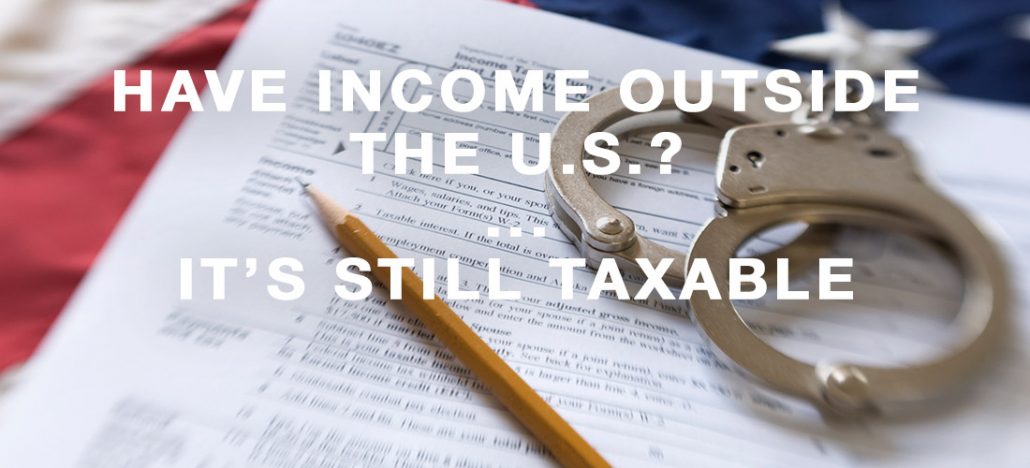Remainder For U.S. Taxpayers – Income from Abroad is Taxable
Many U.S. citizens and resident aliens receive income from foreign sources. There have been recent reports about the interest of the IRS in U.S. taxpayers with bank accounts in Liechtenstein but you should know that the interest of the IRS extends beyond bank accounts in Liechtenstein but to bank accounts anywhere in the world.
U.S. Taxpayers Taxed On Worldwide Income.
If you are a U.S. citizen or resident alien, you must report income from all sources within and outside of the U.S. This is true whether or not you receive a Form W-2 Wage and Tax Statement, a Form 1099 (Information Return) or the foreign equivalents. Additionally, if you are a U.S. citizen or resident alien, the rules for filing income, estate and gift tax returns and for paying estimated tax are generally the same whether you are living in the U.S. or abroad.
Hiding Income Offshore.
Not reporting income from foreign sources may be a crime. The IRS and foreign revenue authorities are pursuing those who hide income or assets offshore to evade taxes. Specially trained IRS examiners focus on aggressive international tax planning, including the abusive use of entities and structures established in foreign jurisdictions. The goal of the IRS is to ensure U.S. citizens and residents are accurately reporting their income and paying the correct tax.
Foreign Financial Accounts.
In addition to reporting your worldwide income, you must also report on your U.S. tax return whether you have any foreign bank or investment accounts. The Bank Secrecy Act requires you to file a Report of Foreign Bank and Financial Accounts (“FBAR”) (FinCEN Form 114, previously Form TD F 90-22.1) if:
- You have financial interest in, signature authority, or other authority over one or more accounts in a foreign country, and
- The aggregate value of all foreign financial accounts exceeds $10,000 at any time during the calendar year.
U.S. Penalties for Non-Compliance.
Federal tax law requires U.S. taxpayers to pay taxes on all income earned worldwide. U.S. taxpayers must also report foreign financial accounts if the total value of the accounts exceeds $10,000 at any time during the calendar year. Willful failure to report a foreign account can result in a fine of up to 50% of the amount in the account at the time of the violation and may even result in the IRS filing criminal charges.
Civil Fraud – If your failure to file is due to fraud, the penalty is 15% for each month or part of a month that your return is late, up to a maximum of 75%.
Criminal Fraud – Any person who willfully attempts in any manner to evade or defeat any tax under the Internal Revenue Code or the payment thereof is, in addition to other penalties provided by law, guilty of a felony and, upon conviction thereof, can be fined not more than $100,000 ($500,000 in the case of a corporation), or imprisoned not more than five years, or both, together with the costs of prosecution (Code Sec. 7201).
The term “willfully” has been interpreted to require a specific intent to violate the law (U.S. v. Pomponio, 429 U.S. 10 (1976)). The term “willfulness” is defined as the voluntary, intentional violation of a known legal duty (Cheek v. U.S., 498 U.S. 192 (1991)).
Additionally, the penalties for FBAR noncompliance are stiffer than the civil tax penalties ordinarily imposed for delinquent taxes. For non-willful violations, it is $10,000 per account per year going back as far as six years. For willful violations, the penalties for noncompliance which the government may impose include a fine of not more than $500,000 and imprisonment of not more than five years, for failure to file a report, supply information, and for filing a false or fraudulent report.
Lastly, failing to file Form 8938 when required could result in a $10,000 penalty, with an additional penalty up to $50,000 for continued failure to file after IRS notification. A 40% penalty on any understatement of tax attributable to non-disclosed assets can also be imposed.
Voluntary Disclosure – Streamlined Filing Compliance Procedures.
A separate program, the Streamlined Filing Compliance Procedures, for U.S. taxpayers who may have been unaware of their filing obligations, has helped about 65,000 additional taxpayers come into compliance. These streamlined procedures will continue to be available for now but the IRS has said it may end this program too at some point.
For taxpayers who were non-willful, we recommend going into the Streamlined Filing Compliance Procedures. Under these procedures the penalty rate is 5% and if you are a foreign person, that penalty can be waived. This is a very popular program and we have had much success qualifying taxpayers and demonstrating to the IRS that their non-compliance was not willful.
What Should You Do?
We encourage taxpayers who are concerned about their undisclosed offshore accounts to come in voluntarily before learning that the U.S. is investigating the bank or banks where they hold accounts. Don’t let another deadline slip by. The IRS will not be keeping this special voluntary disclosure program open indefinitely and once the IRS contacts you, you cannot get into this program and would be subject to the maximum penalties (civil and criminal) under the tax law. Protect yourself from excessive fines and possible jail time. Let the tax attorneys of the Law Offices Of Jeffrey B. Kahn, P.C. located in Orange County (Irvine), San Francisco Bay Area (including San Jose and Walnut Creek) and elsewhere in California help ensure that you are in compliance with federal tax laws. Also, if you are involved in cannabis, check out how our cannabis tax attorneys can help you.


 Follow
Follow Follow
Follow
